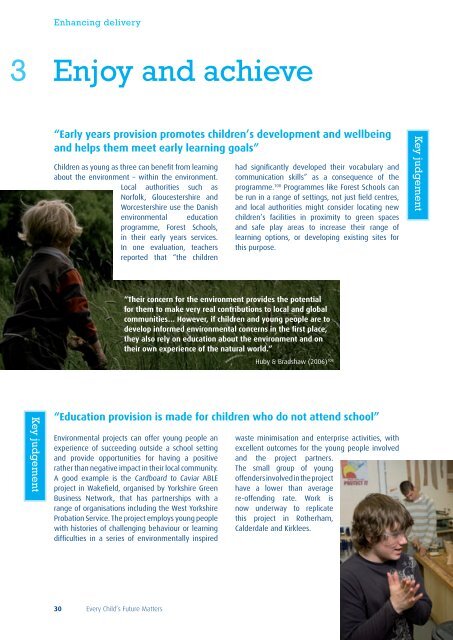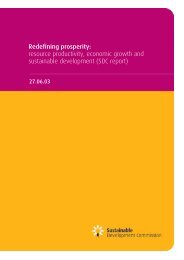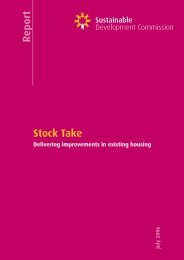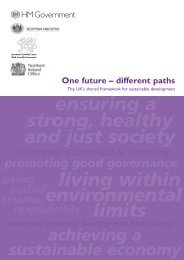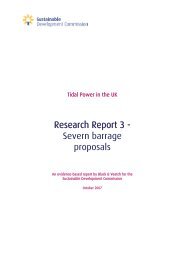Every Child's Future Matters - Sustainable Development Commission
Every Child's Future Matters - Sustainable Development Commission
Every Child's Future Matters - Sustainable Development Commission
You also want an ePaper? Increase the reach of your titles
YUMPU automatically turns print PDFs into web optimized ePapers that Google loves.
Enhancing delivery<br />
3 Enjoy and achieve<br />
“Early years provision promotes children’s development and wellbeing<br />
and helps them meet early learning goals”<br />
Children as young as three can benefit from learning<br />
about the environment – within the environment.<br />
Local authorities such as<br />
Norfolk, Gloucestershire and<br />
Worcestershire use the Danish<br />
environmental education<br />
programme, Forest Schools,<br />
in their early years services.<br />
In one evaluation, teachers<br />
reported that “the children<br />
had significantly developed their vocabulary and<br />
communication skills” as a consequence of the<br />
programme. 100 Programmes like Forest Schools can<br />
be run in a range of settings, not just field centres,<br />
and local authorities might consider locating new<br />
children’s facilities in proximity to green spaces<br />
and safe play areas to increase their range of<br />
learning options, or developing existing sites for<br />
this purpose.<br />
Key judgement<br />
“Their concern for the environment provides the potential<br />
for them to make very real contributions to local and global<br />
communities… However, if children and young people are to<br />
develop informed environmental concerns in the first place,<br />
they also rely on education about the environment and on<br />
their own experience of the natural world.”<br />
Huby & Bradshaw (2006) 108<br />
Key judgement<br />
“Education provision is made for children who do not attend school”<br />
Environmental projects can offer young people an<br />
experience of succeeding outside a school setting<br />
and provide opportunities for having a positive<br />
rather than negative impact in their local community.<br />
A good example is the Cardboard to Caviar ABLE<br />
project in Wakefield, organised by Yorkshire Green<br />
Business Network, that has partnerships with a<br />
range of organisations including the West Yorkshire<br />
Probation Service. The project employs young people<br />
with histories of challenging behaviour or learning<br />
difficulties in a series of environmentally inspired<br />
waste minimisation and enterprise activities, with<br />
excellent outcomes for the young people involved<br />
and the project partners.<br />
The small group of young<br />
offenders involved in the project<br />
have a lower than average<br />
re-offending rate. Work is<br />
now underway to replicate<br />
this project in Rotherham,<br />
Calderdale and Kirklees.<br />
30 <strong>Every</strong> Child’s <strong>Future</strong> <strong>Matters</strong>


